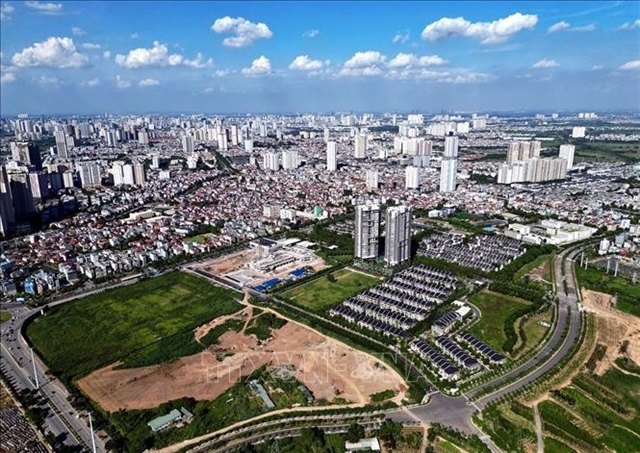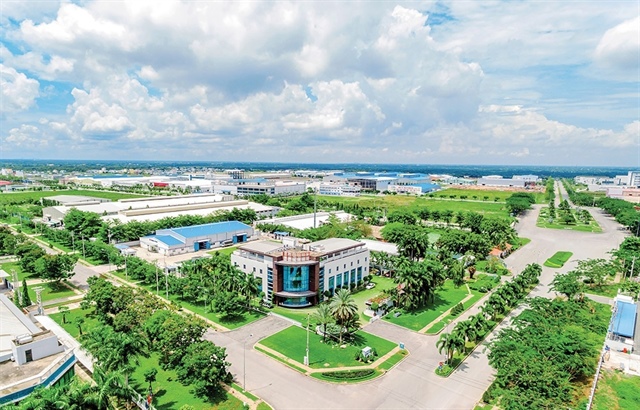FDI gives wings to the banking sector
FDI gives wings to the banking sector
Growing along with the local economy for the past 30 years, foreign direct investment inflows have played a part in shaping the local economy, particularly the finance and banking sector. HSBC Vietnam CEO Pham Hong Hai writes about how foreign investment helped Vietnam go where it is now.
FDI and its magic wand
Vietnam has been welcoming foreign direct investment (FDI) inflows since 1988, following the issuance of the Law on Foreign Investment by the National Assembly at the time – a time when foreign investment was a rather effective form of international economic co-operation for developing countries. The law created an improved legal framework and opened the doors to foreign funds. After some 30 years of rises and falls, the country has indeed succeeded in attracting FDI, despite the fact that there has been a time when foreign investments did not live up to their full potential.
Take a closer look at the backbone of the economy: in the finance and banking sector, we see an area that is growing more and more important and, with the potential of an economy consisting of over 96 million people, it has caught the attention of many foreign investors. Back in 2006-2007, foreign investors started to acquire stakes to become strategic investors at local banks. Nevertheless, the foreign ownership limit (FOL) at local banks is capped at 30 per cent, and the highest stakes that a foreign bank can acquire to become a local bank’s strategic investor is set at 20 per cent. These thresholds prevented foreign banks from transforming local banks as they do not have veto rights. Foreign capital getting to local banks, as a result, was on the light side.
With Vietnam joining the World Trade Organization (WTO) in 2007, a foundation was laid for the entrance of international financial institutions into the local finance and banking sector, as regulations on foreign financial institutions were relaxed to allow them to open branches and transaction offices in the country. Removing the restrictions on VND-denominated deposits and increasing space for foreign players to expand banking services helped amplify the activities of those foreign credit institutions.
Since 2009, given the strong commitment of the Vietnamese government to the WTO and the recognition of the vital role of a strong financial sector, 100 per cent foreign-owned banks have been allowed to be incorporated in Vietnam, marking a crucial milestone. The foreign players can rely on their sound financial and professional capabilities to expand their network and compete in a healthy manner with domestic ones. By the end of 2017, there have been more than 50 credit institutions operating in the country, nine of which are wholly foreign-owned.
The involvement of foreign banks has more or less promoted competition, offering customers more benefits while contributing to the development of the sector. Be it a foreign or a local bank, success comes down to understanding customers, upgrading and diversifying products and services, and improving procedures to serve the customer segment of choice. FDI, in this case, has acted as a key to enhancing local banks’ financial capabilities, corporate governance, labour productivity, and, to a broader extent, enhancing the competitiveness of the local economy.
While domestic banks have the advantage in branch networks and long-established relationships with local communities, foreign banks have the lead in internationally proven, sophisticated products and services and global-scale networks and relations, which Vietnamese customers, both corporate and individual, need in the era of economic connectedness and rising incomes.
What is more, foreign capital flows into Vietnamese banks also help stimulate the management of bad debts, raise the capital adequacy ratio (CAR), and speed up the adoption of Basel II. Strengthening the local banking sector can therefore help the country raise its credit rating, which will in turn make it able to attract more funds into many other areas.
The beauty that pays
So, what makes Vietnam attractive in the eyes of foreign investors?
Vietnam has grown into a bright star of Asia over the past 30 years, thanks to its steady economic growth, stable political and social environment, young population, and an open government that has a supportive mind for development and opening up for economic integration through a series of trade agreements. By end of 2017, the country signed up 12 bilateral and multilateral free trade pacts with 56 economies around the world and in early this year, a new trade pact, the Comprehensive and Progressive Agreement for Trans-Pacific Partnership. Foreign investors have chosen Vietnam to be their preferred investment destination as the country is now connected with many countries out there.
The great potential of the retail market is another magnet for foreign investment. In 2016, 35 per cent of the population lived in urban areas and this figure is projected to continue growing robustly, reaching some 40 per cent by 2020. The urban population has helped bolster demand for modern shopping experienced, thus attracting many international retail giants. According to the General Statistics Office, the total value of the local retail market was estimated at $130 billion in 2017 and forecast to increase to $179 billion by 2020. During 2007-2016, the figure averaged at 20 per cent, some seven-fold higher since Vietnam joined the WTO.
The local government has been actively improving the investment environment, removing or reducing many tariff lines within the ASEAN Economic Community as well as the free trade pacts. This has boosted exports into partner countries, which in turn drew in more foreign banks as the demand for financial and banking services among businesses is on the rise, particularly for those of foreign-invested ones.
Vietnam has also been playing a more central role in manufacturing after its production and manufacturing activities have grown stronger than its neighbours, which then attracted more funds into the area.
As Vietnam became more accessible to foreign investors, FDI has been soaring steadily in recent years. FDI in Vietnam registered in 2017 reached $35.88 billion, up 44 per cent against the previous year, hitting a record height since 2009.
Given these factors, the nation has been able to magnetise a great deal of foreign capital in many sectors over the years and more foreign banks are tapping into the local banking market. They focus either on serving corporate clients arriving from their home countries or on expanding the retail banking market.
More cash on banks
Following the restructuring progress, the health of the banking sector has improved over time on the back of a more competitive environment and better legal platform, and this promises to become another sector of foreign interest.
In my view, foreign investors are pretty optimistic about Vietnam’s economic prospects and they are looking to expand their business. The finance and banking sector will benefit from such movements, and the growth of the economy and businesses will lead to an increase in the demand for finance and banking services.
I think international financial institutions will not invest sporadically and will instead focus on their strengths as well as corporate governance and risk management. Enhancing customer experience with digitalised features will also be an area of focus for banks to invest in.
We now see a tendency where foreign banks are not spreading their investment on the horizon, but rather focusing on developing the markets in which they have the competitive advantage and scale and capability to generate growth in line with their groups’ strategy. They may also not focus on mergers and acquisitions or on becoming strategic partners of local banks, but will turn towards the organic growth of their local units.
Foreign investment funds, meanwhile, are more likely to actively seek to invest in local banks with room for growth and healthy corporate governance.























